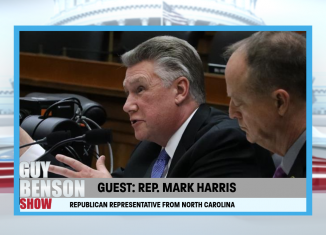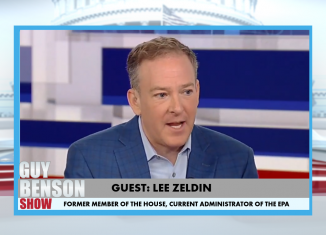Byron York: Trump knew this material was classified
Listen Below:
Full Transcript:
Guy Benson: We are joined now by Byron York, chief political correspondent at the Washington Examiner and a Fox News contributor. Byron, welcome back to the show.
Byron York: Hello, Guy. Good to be here.
Guy Benson: Let’s talk about this indictment against the former president and specifically this audiotape that emerged. It was leaked to CNN. We addressed it on the show here yesterday, and to me, it was pretty damning for Trump. And I actually have a theory here, and I wonder what you think of it. My theory is that the prosecutors in this case set a trap. They gave us just enough details about the audiotape that they obviously have in their possession to indicate that there were some potential serious problems, at least with this one exchange at Bedminster, Trump’s club in New Jersey, showing classified documents, highly classified documents, apparently, to people who didn’t have any right to see them. And, of course, part of the argument is he didn’t have a right to possess them. In any case, they gave us little partial transcripts with lots of ellipses of what was said, perhaps allowing Donald Trump to concoct some sort of counter spin or explanation that would fit with that limited information, I should say. And then as soon as he was out with that, with our colleague Bret Baer, within days, they dropped the tape and it kind of implodes the whole thing that Trump was trying to argue. And now he’s off to a new excuse, which is it was just bravado all along. He he didn’t really have that classified material. He wasn’t showing that particular document to these people who were at his house. I just wonder, does that sound plausible to you? Because whatever you think of Trump and whether this stuff matters to you or not, this audiotape could present a serious legal complication for him and for non hardcore supporters. It could also cause more political problems for him.
Byron York: Yeah, well, the audio tape has been considered even before the indictment came out as kind of the heart of the indictment, because it said to show that Trump knew this material was classified, knew he had not declassified it when he was president, and knew that he could not declassify it after he was president. So it was kind of a state of his knowledge thing. Now, what is what struck me, I should also say, as far as leaks are concerned, I’m always very cautious about that. How many people have at least some of this audiotape right now or that that’s your universe of people who could leak? I just don’t know who it is. So I have I haven’t really suggested that. One thing that I found troubling about this is, you know, there are 31 counts of specific documents that Trump is said to have mishandled with national defense information.
Guy Benson: But not this one. Right? Not this one.
Byron York: But this is not one of them. So it’s kind of the heart of the case showing what I was just explaining. And you think, well, of course, they’ve charged him with mishandling this document. He was rifling through in front of these people, haven’t they? And the answer is no. And I think that’s troubling. I mean, maybe do they not have it? Have they not seen it? Are they guessing? And since they’re guessing, they’re not going to charge him with that? So I don’t know. But I think it’s certainly a weak part in this case.
Guy Benson: Yeah. I think the fact that CBS News confirmed that the document he was apparently showing these people was not among those named specifically in the indictment, I think is interesting. His new defense is always all just bravado. I was saying these things, but I didn’t really mean them. I also wonder if Jack Smith and company anticipating that as well from Donald Trump have spoken to the people in the room, you know, in serious interviews and know what people will testify to on that front. It seems like they might have been a couple steps ahead of Trump this time. I guess we’ll see. To me, the heart of the case is the the obstruction side and the instructing his aides to move the boxes and the documents as to avoid the subpoena and the FBI and his own lawyers. That, to me, is the heart of the case. And that isn’t really affected by the audiotape. To me, the significance of the audiotape is, Byron, at least Trump saying out loud. That he, as you pointed out. It’s not even like hinted. He says it explicitly. “Look at this. It was prepared by the military for me. Isn’t this interesting? Isn’t this cool? By the way, this is highly confidential, very secret. This is still classified. I could have declassified when I was president, but I can’t now. So this is still secret. And then one of the aides off, off to the side says, Well, now we have a problem. “That’s Trump in his own words, admitting that he understands the rules and how this works, and was at least boasting in that moment on tape of violating the rules anyway. So, I mean, I agree that there needs to be a resolution on the question of why that document in question here wasn’t among the 31. But in terms of Trump’s acknowledgment of what the rules are and what he could and could not do, and then breaking those rules anyway in a courtroom and also in a court of public opinion, those are not helpful facts to him, at least from where I sit.
Byron York: And, you know, he literally said, isn’t this cool? I mean, he actually said that. And, you know, when he when he came up with the bravado argument, I thought, you know, he should have been saying that all along. I was bragging. I mean, come on. I was bragging. And that that’s clearly what he was doing. As far as Jackson speaking to people in a room, assuming I’m assuming that he has as you noticed, this is not a covert, secretly recorded tape cover that you’re doing an interview. You know, there was it was a whole bunch of books about Trump in the Trump presidency that came out in the year after he left office. And a lot of the authors were making pilgrimages to Mar a Lago or in this case, Bedminster to interview Trump. And he did a lot of interviews. And these interviews are recorded. And there’s no no question about what the basis of it is. He’s sitting there with a recording device in front of it, and that’s what he was doing with people who were working on Mark Meadows book. Mark Meadows is not writing a book like maybe you and I would do by kind of sweating over the laptop. But these were people who were going to write this book. So Trump, you know, he was in a position in which he knew he’s being recorded, and it was clearly kind of showing off. Which leads me to something I’ve been thinking about about this case. I think we have a significant number of people who look at this case and they’re not going to say, oh, Donald Trump had the authority to declassify these things with his mind. They’re not going to say, Oh, we have the power to take anything you wanted. They’re not going to say no. He had no idea these were classified. There’s not. They’re not going to defend him on those lines, But they’re still going to say this case should not have been brought. Nevertheless, this case should not have been brought because there were other ways to deal with this. And the the the division and controversy and political turmoil that this case is bringing about is something that we shouldn’t have have gone there. And I think there are a number of people who feel that way. You’ve seen articles suggesting that Trump be pardoned, and that’s, I think, where a number of conservatives and Republicans are going who are not going to try to make a defense of Trump on the facts of this.
Guy Benson: Right. To me, I think the defenses of him on the facts are extremely weak and constantly evolving based on new information and whatever is blurting out of his mouth. You know, if he had gone with the bravado route from the beginning, then, you know, maybe that would have had more residents. But he told Bret Baer that there was no document at all. Now, it’s very clear there was some document and he was describing it as one prepared by the military, not declassified and still secret. There was a document and now he’s saying, well, but it was it was it was bravado. And the document really wasn’t what I was saying that it was I mean, it just the thing keeps changing and keeps shifting. And that’s part of the problem with defending Trump. Sometimes he’ll go out on a limb for him and then he’ll saw it right off. And in this case, I think a trap was set for him and he sprinted into the trap. I also wonder, before I address the last point that you made. If he was willing to. Show whatever this sensitive information was to these people, knowing that recorders were rolling and knowing that he jealously wanted to keep some of these classified materials and refused to give them back and obstructed and all of that allegedly in order to to keep them. You wonder how many other people was he parading through and showing them all sorts of things that weren’t caught on tape? I mean, that that’s another thing to ponder. And I would imagine that’s something that if it ever comes to trial that the jury might be asked to imagine and their minds might wander to some imaginations that are not terribly farfetched on where some people might land. You just described it. Not going to defend Trump on the merits, but still saying for the good of the country and for other reasons, this was not a good case to bring. The counterpoint to that, Byron, is if you have someone who is aggressively and intentionally. Lying to the FBI and avoiding compliance with a subpoena and withholding information and lying to his own lawyer to the point that they’re now committing crimes, attesting to things, perjuring themselves unbeknownst to them, because he’s lied to them. That element of it is so serious beyond just having the stuff that he’s not supposed to have. How can you not charge? I think that that’s a fair counterpoint. On the other hand, this is not what about ism, it’s just about ism. Hillary Clinton and her secret server and all of the nonsense that she pulled there. She destroyed a lot of that evidence. She and her team destroyed evidence and lied about it, which is a similar pattern of behavior. And famously she wasn’t charged. So that would reinforce the point that you made. I just don’t know what the right answer is there.
Byron York: Hillary Clinton, just for anyone who might have forgotten, had her staff used a program called Bleach Bit to destroy all of her emails and then they physically destroyed the phones, the devices in which these emails were on, they did with hammers. And so bleach, which which Trump has always referred to as acid, was used that she acid washed away her her emails. And of course, the kind of the original sin here is that she had these 60,000 plus emails and she alone decided which one she would hand over or preserve and which ones she wouldn’t write, and.
Guy Benson: Claimed that there was nothing classified. And that was a lie. That was a big lie.
Byron York: Yeah. So look, that was a bad thing. No, no. Should I? I think a lot of people think that when James Comey, in a letter to Congress, who was the FBI director at the time, brought the Hillary thing back up over over the July 4th weekend in 2016, he puts it to bed, he comes out and says she’s guilty as hell, but we’re not going to charge her. That’s really the bottom line of his press conference. And then the case goes away. And then ten days before the election, he brings it back by sending a letter to Congress saying, oh, we’ve got this Anthony Weiner laptop and it may have other emails on it. We’re having to look at it really, really fast. And, you know, that struck me as was it election meddling. It was certainly okay, darn too close to the election to do something that big. And so we’ve had this we’ve had a situation in the last few years in which we had both candidates, both major candidates for the presidency under FBI investigation during the campaign. And so you ask yourself, well, you know, maybe they’re both two questionable characters, or maybe maybe the FBI is like, too in the politics here is too.
Guy Benson: Or maybe all of the above. I’m going to go with all of the above on that particular question, Byron. But yeah, Hillary Clinton ended up paying a very serious political price for what she did, not a legal one. We’ll see how this goes with Trump on the legal side. But there’s also the political component. And you just wonder, watching this, do a bunch of independents and swing voters say, oh, yeah, this is great. Let’s get back in the Trump camp. That’s the political question for Republicans to think about. Byron York on the Guy Benson Show. Thank you, sir. We’ll be right back.







